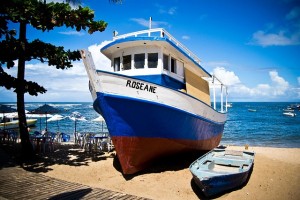boat
[noun]
[de boot, de bo-ten] 
 ‘Boot’ is the general word for ‘boat’. When you are looking for boots to wear, we call them ‘laarzen’. Bigger ships are called ‘schepen’ in Dutch, with singular form ‘schip’. It’s sometimes a bit unclear when a vessel is a ‘boot’ or a ‘schip’, in general smaller vessels are a ‘boot’. I’ve insulted sailors in the past by referring to their ‘schip’ as a ‘boot’.
‘Boot’ is the general word for ‘boat’. When you are looking for boots to wear, we call them ‘laarzen’. Bigger ships are called ‘schepen’ in Dutch, with singular form ‘schip’. It’s sometimes a bit unclear when a vessel is a ‘boot’ or a ‘schip’, in general smaller vessels are a ‘boot’. I’ve insulted sailors in the past by referring to their ‘schip’ as a ‘boot’.
The general verb for ‘to sail’ and ‘to (go) boat(ing)’ in Dutch is ‘varen’. When you are really sailing (i.e. using the wind), we say ‘zeilen’.
Examples:
– “Als je in Amsterdam bent, moet je zeker een keer een tocht maken met een rondvaartboot.”
(“When in Amsterdam, you should really do a canal cruise.” Lit. “make a trip with a round-trip boat.”)
– “Ik zou wel een boot willen hebben, maar een boot moet je onderhouden en daar heb ik geen zin in!”
(“I would like to have a boat, but a boat has to be maintained and I don’t feel like doing that!”)
– “Zo dat is een grote boot!” – “Het is meer een schip dan een boot hoor!” – “O, sorry hoor!”
(“My, that is a big boat!” – “Hey, it’s more of a ship than a boat!” – “Oh, I beg your pardon!”)
– “We gaan op vakantie naar Zuid-Frankrijk en we nemen onze boot mee!” – “Zo, chique chic hoor, maar kunnen jullie dan niet beter gaan varen? (I.p.v. rijden?)”
(“We’re going on holiday to the southern parts of France and we are bringing our boat!” – “My, fan-cy, but hadn’t you better sail? (Instead of driving?)”)
Expressions:
– “De boot afhouden”: to refuse to commit oneself, to keep one’s distance.
– “De boot missen“: to miss the boat.
Example:
– “Een paar jaar geleden leek het erop dat er iets was tussen ons, maar we hebben nu definitief de boot gemist…”
(“A few years ago it seemed there was something going on between us, but by now we have missed the boat for sure.”)
Related words:
– Varen: to sail, to (go) boat(ing) [verb] [voer, gevaren].
– Vaartuig: vessel [noun] [het vaartuig, de vaartuigen].
– Boottocht(je): boat trip/excursion [de (het) boottocht(je), de boottocht(jes)].
– Zeeman: sailor, seaman [noun] [de zeeman, de zeemannen].
– Schip: ship [noun] [het schip, de schepen].
– Stoomboot: steamboat, steamship [noun] [de stoomboot, de stoomboten].
Example:
– “Zie ginds komt de stoomboot uit Spanje weer aan.”
(“Look over there, the steamboat from Spain is arriving.” From a children’s song that welcomes Sinterklaas who traditionally arrives from Spain by steamboat.)
– Veerboot: ferry [noun] [de veerboot, de veerboten]. We also say ‘(het) veer’ or ‘(veer)pont’, the latter for smaller ferries sometimes also referred to as ‘pontje’.
– Bootje: small boat to take for short trips, e.g. on the Amsterdam canals [noun] [het bootje, de bootjes].
– Onderzeeër: submarine [noun] [de onderzeeër, de onderzeeërs]. “Onder zee” means “below sea”.

Spelfoutje: “chique hoor” moet “chic hoor” zijn.
Bedankt! Ik heb het aangepast.
To all others: the mistake I made is that the spelling ‘chique’ only applies when declining the adjective ‘chic’ leads to an ending in -e.
As ‘chice’ would be mispronounced, it’s written ‘chique’.
E.g. “Die jurk is chic” and “De chique jurk”.
Just recently discovered your blog and I like it.
The most important difference between a ‘veerboot’ and a ‘pont’ is not the size; it’s that a ‘pont’ usually connects to points on the opposite banks of a river or canal, whereas a ‘veerboot’ can connect quite distant places e.g. UK ports and continental ones.
A bigger ‘pont’ might be called a ‘veerboot’ as well, but it still remains a ‘pont’.
Keep up the good work.